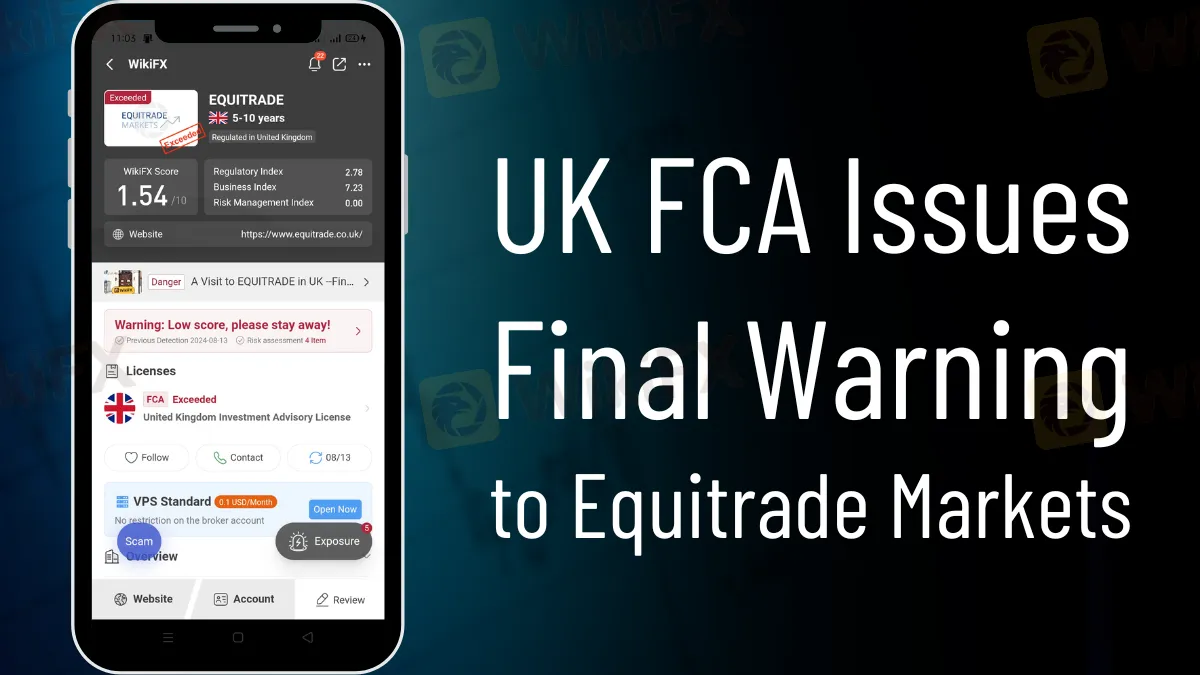简体中文
繁體中文
English
Pусский
日本語
ภาษาไทย
Tiếng Việt
Bahasa Indonesia
Español
हिन्दी
Filippiiniläinen
Français
Deutsch
Português
Türkçe
한국어
العربية
UK FCA Issues Final Warning to Equitrade Markets
Abstract:The UK FCA has issued a final warning to Equitrade Markets, revoking its license due to serious regulatory breaches and lack of compliance.

The UK Financial Conduct Authority (FCA) has taken serious action against Equitrade Markets Ltd, issuing a Decision Notice revoking the firm's Part 4A authorization. This decision comes after the FCA conducted a comprehensive investigation and determined that Equitrade Markets has continuously failed to fulfill the regulatory criteria necessary to operate as a financial service provider in the UK.
The FCA's decision is based on concerns that Equitrade Markets does not meet the appropriateness Threshold Condition, which is a key criterion for all regulated organizations. The Authority found that the business is not a “fit and proper” entity, owing to its inability to conduct its activities soundly and responsibly. This conclusion demonstrates the FCA's commitment to ensuring that all enterprises under its authority operate honestly and responsibly.

One of the primary points raised by the FCA is Equitrade Markets' continuous inability to comply with the regulatory duty to submit the requisite Returns. Despite several inquiries from the FCA, the business failed to meet its duties, indicating a lack of transparency and collaboration. This non-compliance immediately breaches Principle 11 of the FCA's Principles for Businesses, which requires enterprises to be open and helpful with the regulator.
The FCA's final warning underscores that Equitrade Markets' major shortcomings, notably in terms of suitability, have led to the unavoidable conclusion that the company is not conducting its business in a way that guarantees its affairs are handled appropriately. As a result, the FCA found that Equitrade Markets did not fulfill the Threshold Conditions for having a Part 4A permit and, therefore, canceled its license.
In parallel, industry watchdog WikiFX has been aggressively monitoring companies like as Equitrade Markets. The broker presently has a poor WikiFX rating of 1.54, which reflects its lack of regulation and failure to renew its FCA licence. WikiFX's continual efforts to identify untrustworthy brokers give useful information for investors, allowing them to make more educated selections.

Note of Awareness
Investors should use care when engaging with financial service providers. Before participating in financial activities, it is essential to establish a firm's regulatory status.
About WikiFX
WikiFX is a worldwide broker regulatory inquiry tool that offers detailed information on brokers, including regulatory status and client comments. WikiFX seeks to safeguard investors by providing clear and trustworthy information on financial service companies globally.
Concerned about your investments? Check the regulatory status and reviews of Equitrade Markets brokers on WikiFX to make informed decisions and protect your assets.

Disclaimer:
The views in this article only represent the author's personal views, and do not constitute investment advice on this platform. This platform does not guarantee the accuracy, completeness and timeliness of the information in the article, and will not be liable for any loss caused by the use of or reliance on the information in the article.
Read more

Never Heard of Dynasty Trade? Here's Why You Should Be Worried
Have you heard this name before? No , it’s time you do because staying unaware could cost you. This platform is currently active in the forex trading and has been linked to several suspicious activities. Even if you’ve never dealt with it directly, there’s a chance it could reach out to you through ads, calls, messages, or social media. That’s why it’s important to know the red flags in advance.

Want to Deposit in the EVM Prime Platform? Stop Before You Lose It ALL
Contemplating forex investments in the EVM Prime platform? Think again! We empathize with those who have been bearing losses after losses with EVM Prime. We don't want you to be its next victim. Read this story that has investor complaints about EVM Prime.

WEEKLY SCAM BROKERS LIST IS OUT! Check it now
If you missed this week's fraud brokers list and are finding it difficult to track them one by one — don’t worry! We’ve brought together all the scam brokers you need to avoid, all in one place. Check this list now to stay alert and protect yourself from fraudulent brokers.

Catch the Latest Update on BotBro & Lavish Chaudhary
BotBro, an AI-based trading platform, became popular in India in 2024—but for negative reasons. Its founder, Lavish Chaudhary, who gained a huge following by promoting it heavily on social media. Since then, he has become well-known, but for many controversies. Let’s know the latest update about Botbro & Lavish Chaudhary.
WikiFX Broker
Latest News
What WikiFX Found When It Looked Into Vestrado
Is the Forex Bonus a Genuine Perk or Just a Gimmick?
eToro Joins Hands with Premiership Women’s Rugby
OctaFX Was Fined $37,000 for Operating Without a License
Hantec Financial: A Closer Look at Its Licenses
Saxo Bank Fined €1 Million by AMF Over Compliance Failures During IT Migration
CySEC Flags Two Unlicensed Investment Platforms: greymax.net and finotivefunding.com
Hantec Markets Appoints New Executives for Growth in Dubai
Olymptrade Under Fire – Fraud Allegations and Investor Outrage
GoPro, Krispy Kreme join the meme party as Wall Street speculation ramps up
Currency Calculator


